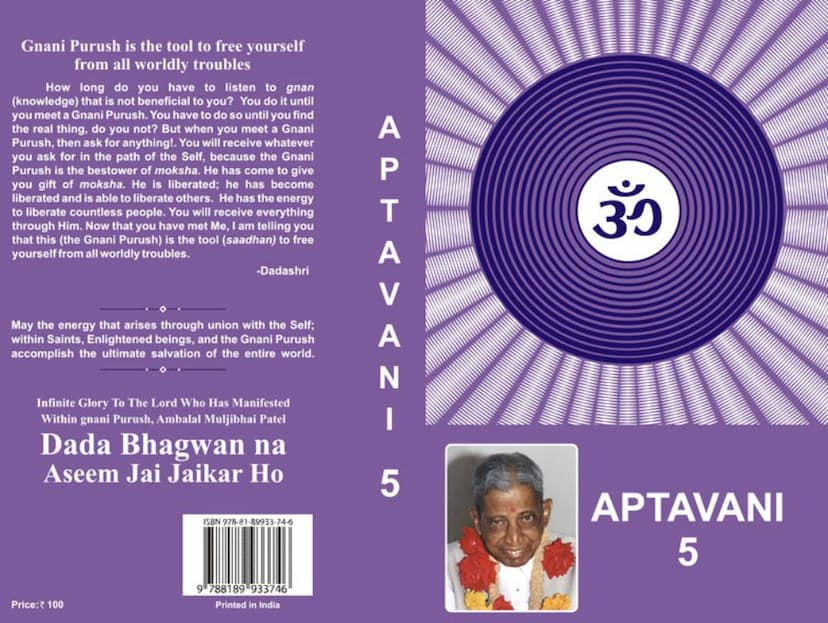Aptavani 05
Added to library: September 1, 2025

Summary
This is a comprehensive summary of "Aptavani 05" by Dada Bhagwan, based on the provided text.
Aptavani 05: The Gnani Purush as the Tool for Self-Realization and Liberation
"Aptavani 05" is a compilation of spiritual discourses by Param Pujya Dadashri (also known as Dada Bhagwan), a Gnani Purush, or an enlightened being, who facilitated a direct and effortless path to Self-realization called Akram Vignan. The book emphasizes that the Gnani Purush is the indispensable "tool" for freedom from all worldly troubles and for attaining ultimate salvation (moksha).
Core Teachings and Concepts:
- The Gnani Purush: The Ultimate Guide: The central theme is the absolute necessity of a Gnani Purush to attain Self-realization. Dadashri explains that while scriptures can offer theoretical knowledge, the experiential knowledge of the Self (Atma Gnan) resides only within a Gnani. Meeting a Gnani Purush and receiving His grace is the direct means to understand and realize the Self.
- Akram Vignan: The Stepless Path: Akram Vignan, as expounded by Dadashri, is presented as a direct, step-less path or a shortcut to Self-realization, in contrast to the traditional "kramic" path that involves arduous, step-by-step spiritual progress. This path is available even in the current era, known as Kali Yuga.
- Self-Realization (Atma Gnan): The primary goal is to realize the true Self, which is pure, eternal, and blissful consciousness (Shuddhatma, Sat Chit Anand). This is achieved through the Gnan Vidhi, a scientific process that lasts about two hours, facilitated by the Gnani Purush, which separates the Self from the non-Self complex.
- The Nature of the Self (Atma) vs. Non-Self (Pudgal): The book meticulously differentiates between the Self (Atma), which is unchanging, pure, and the Knower-Seer (Gnata-Drashta), and the non-Self complex (pudgal), which includes the mind, intellect, chit, and ego, and is constantly changing and subject to the laws of cause and effect (vyavasthit). The Self is described as the only permanent and blissful entity.
- Doership and the Ego: A key concept is the elimination of the belief "I am the doer" (karta bhaav), which is the root cause of karmic bondage and worldly suffering. The Gnani Purush reveals that the Self is not the doer; all actions are performed by the non-Self complex (prakruti) as per scientific circumstantial evidences (vyavasthit). The ego, which falsely claims doership, is the entity that needs to be understood and dissolved. The Self is inherently egoless.
- Understanding Vyavasthit (Scientific Circumstantial Evidences): The world operates under the immutable law of vyavasthit. Recognizing that all events, whether pleasant or unpleasant, are the result of past karmic causes and are unfolding scientifically, helps one remain detached and free from suffering. The Gnani Purush helps one understand and accept vyavasthit, thereby resolving internal conflicts.
- Kashays (Anger, Pride, Deceit, Greed): These are identified as the root cause of suffering and worldly life. Akram Vignan leads to the dissolution of kashays through Self-realization, unlike the kramic path where kashays are gradually weakened.
- Absolute Humility (Param Vinaya): This is presented as a crucial quality essential for progress on the spiritual path, especially in the presence of the Gnani Purush. It arises spontaneously after Self-realization and leads to both worldly benefits and spiritual progress.
- Pratikraman: This is the process of acknowledging, repenting for, and resolving not to repeat any wrongdoings or hurt caused to others (through mind, speech, or body). It is a vital practice for purifying the self and resolving karma.
- Akram Vignan's Approach to the Mind and Intellect: The book explains that the mind (mun) is meant for thinking, and the intellect (buddhi) for making decisions, but these should not be the basis of one's Self-identity. The Gnani Purush helps in managing these faculties and ultimately freeing the Self from their influence.
- The Role of Faith and Understanding: While faith (shraddha) can be transient, vision (darshan) or understanding is more stable. Gnan (experiential knowledge) arises from complete understanding, which in turn manifests in conduct (charitra).
- The Nature of Bliss: True bliss (anand) is found in the Self, which is permanent and unaffected by external circumstances or the experiences of pleasure and pain. The goal is to remain in the awareness of the Self, experiencing unwavering bliss and freedom from suffering.
- Liberation (Moksha): Moksha is the ultimate goal, which is the state of complete freedom from all worldly bondage and suffering. It is attainable here and now through Akram Vignan by meeting the Gnani Purush and following His Agnas (directives).
- The Current Era (Kali Yuga/Dushamkaal): Dadashri describes the current era as one where spiritual progress is accelerated, and the Akram Vignan path is like the "last train" to liberation, offering a direct and potent means to achieve this goal due to the dwindling spiritual opportunities in this age.
Key Figures in Akram Vignan:
- Dada Bhagwan: The spiritual name given by Ambalal M. Patel to the pure Self manifested within him, which resides in all beings.
- Ambalal Muljibhai Patel (Dadashri): The Gnani Purush who attained Self-realization in 1958 and founded Akram Vignan.
- Dr. Niruben Amin (Niruma): Dadashri's successor, who diligently carried forward His mission and spread the knowledge of Akram Vignan globally.
- Pujya Deepakbhai Desai: The current spiritual master, continuing the lineage of Akram Vignan and imparting Self-knowledge to seekers worldwide.
In essence, "Aptavani 05" serves as a guide to understanding the Akram Vignan path, highlighting the pivotal role of the Gnani Purush in leading the seeker to the direct experience of the Self, thereby freeing them from the cycles of birth and death and the inherent sufferings of the world. The book advocates for a scientific, experiential approach to spirituality, emphasizing understanding and grace over ritualistic practices.